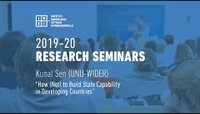How (Not) to Build State Capability in Developing Countries
Kunal Sen (UNU-WIDER)
Research seminar available in video:
The conventional way that donors and other development actors approach the challenge of economic and social development in low income contexts is to advise governments in developing countries to adopt formal laws, regulations and policies that they have seen to have worked in Western countries. The advocacy of such laws, regulations and policies is based on the premise that donors have – if these laws, regulations and policies have worked in the country contexts in which the donors are based (mostly rich Western democracies), why should they not work elsewhere? I argue that such an approach to state building in countries with weak institutional context, which is to try and spread ‘best practice’, irrespective of organisational capability – or a realistic plan to build such capability - makes matters worse, not better. With low state capability and high levels of de jure regulation, one is in the paradoxical situation that any attempts to achieve legitimate public purpose by increasing regulatory stringency can lead to even less compliance – and less likelihood of creating a positive dynamic in improving the regulatory agencies’ capability. This suggests that building state capability in any endeavour needs to start from the political authorisation to solve locally nominated problems, not from the vague idea that equates capability with rule compliance.
Professor Kunal Sen has over three decades of experience in academic and applied development economics research. He is the author of eight books and the editor of five volumes on the economics and political economy of development. From 2019 he is the Director of UNU-WIDER, and he is a professor of development economics at the Global Development Institute, University of Manchester.
Professor Sen is a leading international expert on the political economy of growth and development. He has performed extensive research on international finance, the political economy determinants of inclusive growth, the dynamics of poverty, social exclusion, female labour force participation, and the informal sector in developing economies. His research has focused on India, East Asia, and sub-Saharan Africa.

